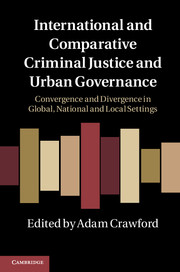 International and Comparative Criminal Justice and Urban Governance
International and Comparative Criminal Justice and Urban Governance from PART 2 - Comparative penal policies
Published online by Cambridge University Press: 05 June 2011
[W]e are confronted with results in comparative political economy which undermine the assumptions of mainstream comparative law about ‘convergence’ and ‘functional equivalence’… Against all expectations that globalization of the markets and computerization of the economy will lead to a convergence of legal regimes and to a functional equivalence of legal norms in responding to their identical problems, the opposite has turned out to be the case. Against all talk of ‘regulatory competition’ which is supposed to wipe out institutional differences, legal regimes under advanced capitalism have not converged.
Teubner 2001: 433In the last decade, there has been a welcome revival of criminal justice scholarship which engages with the macro-level political–economic forces which are shaping criminal justice policy in western democracies. Many of these accounts are rooted in the global economic changes which began in the 1970s – recession, the contraction or even collapse of manufacturing industries, the growth of unemployment and the creation of a large sector of people either long-term unemployed or employed in insecure forms of work. These changes, it is argued, have eroded the consensus which sustained post-war penal welfarism. As significantly rising recorded crime across Western countries gradually produced a situation in which the experience of criminal victimisation, and of managing the risk and fear of crime, became normal features of everyday life for the economically secure, crime became an increasingly politicised issue, generating a ‘penal populism’ which brought in its wake a combination of repressive and managerial criminal justice strategies.
To save this book to your Kindle, first ensure [email protected] is added to your Approved Personal Document E-mail List under your Personal Document Settings on the Manage Your Content and Devices page of your Amazon account. Then enter the ‘name’ part of your Kindle email address below. Find out more about saving to your Kindle.
Note you can select to save to either the @free.kindle.com or @kindle.com variations. ‘@free.kindle.com’ emails are free but can only be saved to your device when it is connected to wi-fi. ‘@kindle.com’ emails can be delivered even when you are not connected to wi-fi, but note that service fees apply.
Find out more about the Kindle Personal Document Service.
To save content items to your account, please confirm that you agree to abide by our usage policies. If this is the first time you use this feature, you will be asked to authorise Cambridge Core to connect with your account. Find out more about saving content to Dropbox.
To save content items to your account, please confirm that you agree to abide by our usage policies. If this is the first time you use this feature, you will be asked to authorise Cambridge Core to connect with your account. Find out more about saving content to Google Drive.